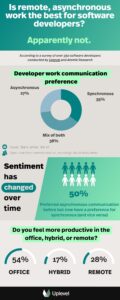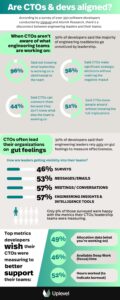91% of developers are unhappy with the metrics their leadership uses
Engineering organizations know they have effectiveness problems but often lack the right metrics or processes to make improvements. A recent survey of over 350 software developers in the US, conducted by Uplevel and Atomik Research, found that CTOs aren’t always aware of what their teams are working on and have a hard time communicating engineering value and direction up, down, and across the organization. Instead, they often rely on gut feelings and intuition to make decisions and measure impact.
“Measurement of software engineering and its impact on the business is still in its infancy. While every company is fast becoming a software company, they don’t all know how to build and deliver software or manage successful technology teams that tightly align to business outcomes. The tools and processes they use to overcome this lack of understanding are insufficient, objective, and manual, delivering static information that immediately goes stale,” said Joe Levy, CEO of Uplevel. “The insights from this survey show us that CTOs and developers need a better way to more effectively communicate and share metrics about people, process, and operational health across the organization.”
CIO INFLUENCE: HTC Global Services and Azentio Software Confirm Strategic Partnership to Offer Next-Generation Digital BFSI Solutions
CTOs aren’t always aware of what engineering teams are working on
One-third of developer respondents believe that the majority of engineering roadblocks go unnoticed by leadership, which highlights a larger struggle with visibility and alignment across all levels of engineering.
When CTOs don’t know what their engineering teams are working on, respondents reported that:
- CTOs will make significant strategic decisions without realizing the negative impact on their team (56%).
- CTOs move people around on projects or tasks without knowing the full implications (51%).
- CTOs can overwork their developers (44%).
Additionally, 96% of developers said not knowing what their own leadership team is working on is detrimental to the larger team.


30% of respondents noted that their engineering leaders rely solely on gut feelings to measure team effectiveness. Additionally, CTOs use the below methods to get visibility into their teams:
- Meetings/conversations (57%)
- Engineering insights & intelligence tools (57%)
- Messages/emails (53%)
- Surveys (46%)
CIO INFLUENCE: Exascend Launches Industrial-Grade SD and MicroSD Cards to Meet Growing IoT Edge Storage Demand
Insights and intelligence tools were seen favorably among developers, with 88% of respondents finding them beneficial and accurate when measuring engineering effectiveness. Despite that, a huge majority (91%) of developers are unhappy with the actual metrics their leadership teams are measuring using these tools. They like the methods being used to collect and analyze their data but want insights that tell a more complete story. The top metrics respondents wish their CTOs were measuring to better support their teams include:
- Data on hours worked (to indicate burnout) (52%)
- Allocation data (what you’re working on) (49%)
- Available Deep Work (focus) time (46%)
Further, despite the general idea that remote and asynchronous work is ideal for software developers, the survey finds that this is not the case:
- Only 27% of software developers listed async (Slack, email, Notion) as their preference for communication.
- 35% prefer synchronous (real-time communication, meetings, live brainstorms).
- 38% prefer a mix of both.
This sentiment has changed over time, with half of the respondents noting that they used to prefer asynchronous communication but now have a preference for synchronous communication (and vice versa). In line with this finding, over half of the respondents (54%) feel more productive in the office.
Uplevel is an Engineering Intelligence Platform that combines machine learning and comprehensive engineering analytics, turning data from standard developer tools into actionable insights for improving organizational health. Using Uplevel, engineering leaders can remove bottlenecks, improve decision-making, and enable more transparent communication up, down, and across the org. Developers get more time to focus on high-impact projects while the business reduces waste, increases revenue, and accelerates impact. Uplevel is headquartered in Seattle, WA.
CIO INFLUENCE: CSI Adds IT Governance to Advisory Services Offering as Cybersecurity, Regulatory Landscapes Grow in Complexity
[To share your insights with us, please write to sghosh@martechseries.com]


